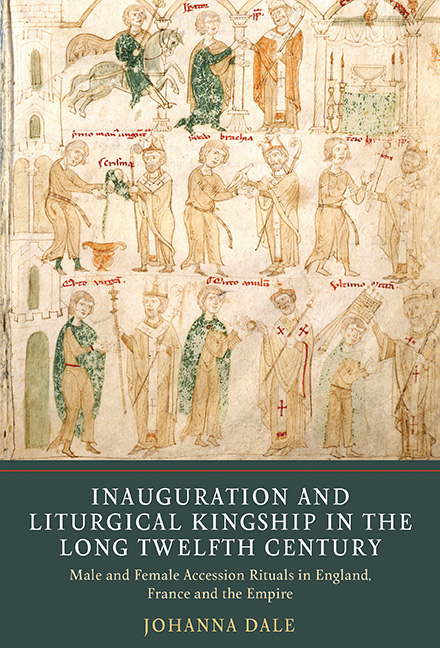 Inauguration and Liturgical Kingship in the Long Twelfth Century
Inauguration and Liturgical Kingship in the Long Twelfth Century Book contents
- Frontmatter
- Contents
- List of Illustrations
- Acknowledgements
- List of Abbreviations
- Timeline
- Genealogies
- Introduction
- 1 Liturgical Texts: The Spoken Word and Song
- 2 Liturgical Rituals: Rubrication and Regalia
- 3 Who and Where? Actors, Location and Legitimacy
- 4 What and When? Consecration and the Liturgical Calendar
- 5 Royal Titles, Anniversaries and their Meaning: The Charter Evidence
- 6 Seal Impressions and Christomimetic Kingship
- Conclusion
- Appendix 1 Editions and Manuscripts of the Selected Ordines
- Appendix 2 Prayer Formulae Incipits
- Appendix 3 Tables of Ritual Elements in the Ordines
- Appendix 4 Brief Descriptions of Royal and Imperial Seals and Bullae
- Bibliography
- Index of Biblical References
- General Index
1 - Liturgical Texts: The Spoken Word and Song
Published online by Cambridge University Press: 25 October 2019
- Frontmatter
- Contents
- List of Illustrations
- Acknowledgements
- List of Abbreviations
- Timeline
- Genealogies
- Introduction
- 1 Liturgical Texts: The Spoken Word and Song
- 2 Liturgical Rituals: Rubrication and Regalia
- 3 Who and Where? Actors, Location and Legitimacy
- 4 What and When? Consecration and the Liturgical Calendar
- 5 Royal Titles, Anniversaries and their Meaning: The Charter Evidence
- 6 Seal Impressions and Christomimetic Kingship
- Conclusion
- Appendix 1 Editions and Manuscripts of the Selected Ordines
- Appendix 2 Prayer Formulae Incipits
- Appendix 3 Tables of Ritual Elements in the Ordines
- Appendix 4 Brief Descriptions of Royal and Imperial Seals and Bullae
- Bibliography
- Index of Biblical References
- General Index
Summary
In February 1111 Henry V's plan to receive imperial coronation was thrown into disarray when Pope Paschal II refused to crown him emperor unless he first renounced episcopal investiture. Following a tumultuous meeting at St Peter's on 12 February, Henry took the pope and a number of his cardinals captive. He held them until he had exhorted a privilege allowing him to continue investing bishops with a ring and staff. This privilege (soon after dubbed a pravilegium or ‘bad law’) was formally confirmed during Henry's imperial inauguration, which took place on 11 April. Some details of this ceremony were recorded by David Scottus, bishop of Bangor, who was apparently present as an imperial chaplain. His original account does not survive, but versions of it were incorporated into the anonymous Latin Kaiserchronik (c.1114) and, with significantly more detail, by William of Malmesbury into his Gesta regum Anglorum. According to William, David reported that
the king was received at the Silver Gate by the bishops and cardinals and the whole clergy of Rome, and the prayer contained in the ordinal being begun by the bishop of Ostia … he was taken to the middle of the Rota, and there was the recipient of a second prayer from the bishop of Porto, as the Roman ordinal prescribes. They then took him with litanies to the shrine of the Apostles, and there the bishop of Ostia anointed him between the shoulders and on the right arm. Next he was taken by the Holy Father to the altar of the same Apostles, and there the pope himself set the crown upon his head, and he was consecrated emperor. After the crowning a mass of the Lord's Resurrection was celebrated, in which before making his communion our lord the pope gave a privilege to the emperor with his own hand.
In his report David twice mentions an ordo, which in the second instance is described as romanus. These references are to a liturgical text for imperial inauguration. David has described a number of elements of this rite, including several prayers and the pre-eminent acts of unction and coronation.
- Type
- Chapter
- Information
- Inauguration and Liturgical Kingship in the Long Twelfth CenturyMale and Female Accession Rituals in England, France and the Empire, pp. 26 - 67Publisher: Boydell & BrewerPrint publication year: 2019


